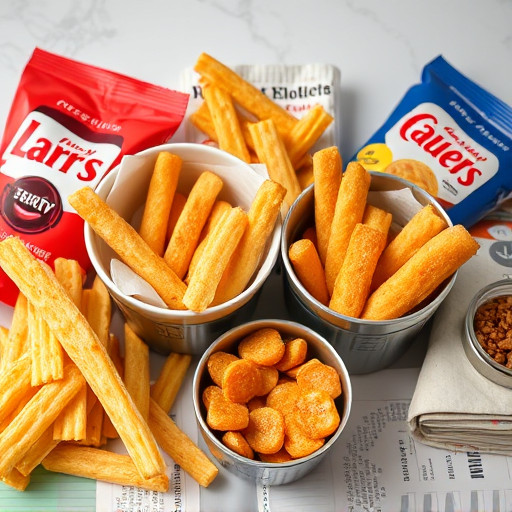Snacks are an integral part of our diet but their health impact depends on variety and portion control. A diverse range of snacks, including fruits, vegetables, whole grains, and lean proteins, ensures a balanced intake of essential nutrients. Mindful eating and awareness of serving sizes prevent overeating. Snacking should complement, not replace, nutritious meals for optimal benefits. Healthy snacks provide a mix of carbohydrates, proteins, and healthy fats, while unhealthy ones offer empty calories and temporary energy spikes. Reading labels carefully helps make informed choices that support overall health. Snacks influence energy levels; choosing complex carbs, protein, and healthy fats prevents energy crashes, while high-sugar snacks lead to subsequent fatigue. Well-planned snacks provide energy and regulate blood sugar. Understanding triggers for cravings, like stress or emotions, can help manage them effectively.
The Impact of Snacks on Our Wellbeing: A Comprehensive Overview
Snacks play a significant role in our daily diets and overall health. This article explores the multifaceted effects of snacking, from nutritional value and energy boosts to weight management and psychological cravings. We delve into how variety and portion control can enhance dietary choices, examining both healthy and unhealthy options. By understanding the impact of snacks on our energy levels and cognitive functions, readers will gain insights to make informed decisions, ultimately fostering a healthier relationship with food. Through this exploration, we aim to debunk common myths and provide strategies to manage snack cravings effectively.
- The Role of Snacks in Our Diet: Exploring Variety and Portion Control
- Nutritional Value: Deciphering Healthy and Unhealthy Snack Options
- Impact on Energy Levels: Snacks as Fuel or Crash?
- Snacking Habits and Weight Management: Debunking Common Myths
- The Psychological Aspect: Why We Crave Snacks and How to Manage Cravings
The Role of Snacks in Our Diet: Exploring Variety and Portion Control

Snacks play a significant role in our daily diet and overall health. They can be a convenient way to satisfy hunger between meals, but their impact on our well-being depends greatly on variety and portion control. Offering a diverse range of snacks ensures we get a balanced intake of essential nutrients. Fruits, vegetables, whole grains, and lean proteins are excellent choices that provide vitamins, minerals, fiber, and healthy fats.
Portion sizes matter too. Overeating, even healthy snacks, can lead to excess calorie intake and potentially negative health outcomes. Practicing mindful eating and being aware of serving sizes help maintain a balanced diet. Moderation is key; snacking should supplement, not replace, nutritious meals. By considering both variety and portion control, we can make snack choices that contribute positively to our overall dietary needs.
Nutritional Value: Deciphering Healthy and Unhealthy Snack Options

When considering the nutritional value of snacks, it’s essential to look beyond their tempting appearances and tantalizing flavors. Healthy snack options should provide a balance of macronutrients—carbohydrates, proteins, and healthy fats—alongside essential vitamins, minerals, and dietary fiber. Look for whole grains, lean proteins, and fresh or frozen fruits and vegetables as the foundation of your snacks. These choices offer sustained energy and essential nutrients without the added sugars and unhealthy fats often found in processed snacks.
On the flip side, unhealthy snack options typically fall short in terms of nutritional value, packing excessive amounts of sugar, saturated fats, and empty calories. While they may provide a quick energy spike, these snacks leave you feeling less satisfied and more prone to cravings later. To make informed choices, read labels carefully, checking ingredient lists and nutrition facts to avoid surprises. Opting for nutritious snacks not only supports your overall health but also helps maintain stable blood sugar levels and keeps you energized throughout the day.
Impact on Energy Levels: Snacks as Fuel or Crash?

Snacks can significantly impact our energy levels throughout the day. The type and timing of snacks play a crucial role in maintaining steady blood sugar levels, which is essential for sustained energy. Complex carbohydrates, such as whole-grain crackers or fruits, provide a slow release of energy, preventing spikes and subsequent crashes. On the other hand, high-sugar snacks can give a quick boost but often lead to an energy dip shortly after, leaving you feeling fatigued and less focused.
Choosing nutritious snacks that include protein, healthy fats, and complex carbs can help regulate your energy levels. These food combinations support stable blood sugar, which in turn promotes mental clarity and physical endurance. By snacking mindfully and selecting fuels that nourish your body, you can avoid the energy crashes associated with less wholesome alternatives.
Snacking Habits and Weight Management: Debunking Common Myths

Snacking habits and their impact on weight management have long been a subject of debate. Many myths surround this topic, with common misconceptions leading people to believe that snacking contributes significantly to weight gain. The truth is, when managed correctly, snacks can be an essential part of a healthy diet.
A well-planned snack break can provide much-needed energy throughout the day, aid in blood sugar regulation, and prevent overeating at mealtimes. Instead of viewing snacks as treats that lead to unwanted weight gain, consider them strategic fuel for your body. The key lies in choosing nutritious options like fruits, nuts, or yogurt, which offer essential vitamins, minerals, and fiber. By understanding portion sizes and selecting wholesome foods, individuals can enjoy the benefits of snacking without compromising their health goals.
The Psychological Aspect: Why We Crave Snacks and How to Manage Cravings

We all have those moments when we suddenly crave a snack, even when we’re not physically hungry. This psychological aspect of snacking is influenced by various factors like emotions, stress, boredom or even our environment. Understanding these triggers is the first step in managing cravings effectively.
One strategy to combat unwanted snacking is mindfulness. Being aware of your hunger cues and recognizing when you’re reaching for food out of habit rather than necessity can help. Keeping a food diary can be helpful too; tracking what, when and why you eat can shed light on patterns and trigger foods. Additionally, prioritizing adequate sleep, staying hydrated, and engaging in regular physical activity can also reduce cravings by stabilizing blood sugar levels and improving overall mood.
Snacking is an integral part of our diet, offering both energy and essential nutrients. By understanding the nutritional value of snacks and practicing mindful portion control, we can make healthier choices that impact our energy levels and support weight management. The psychological aspect of snacking cravings provides insights into our eating habits, enabling us to develop strategies for better control. In conclusion, being aware of our snack selections and consuming them wisely is a key component of maintaining overall health and well-being.


